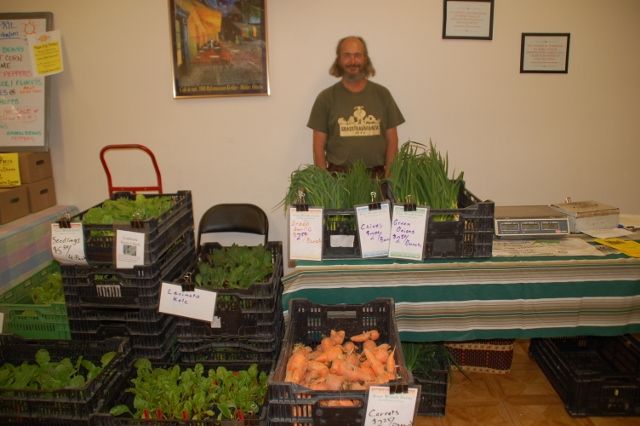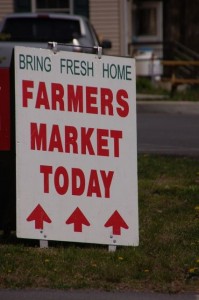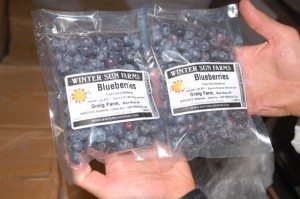
We always see the farmers market in front of the Lecture Center on Thursdays. We can also see them by the 36 Main Restaurant and Wine Bar parking lot on Sundays. That’s not the only kind of local business our farmers get. Much of the New Paltz food industry has taken a lot of pride in locally grown foods and for good reason.
Supporting local food farmers, and even regional farmers, is economically supportive to communities such as New Paltz. In fact, New Paltz has the most Community Supported Agriculture (CSA) in the entire country, according to one local businessman. As small businesses themselves, these restaurants, bakeries, delis, and other food distributors find that local support is essential to community and personal health.
“It’s more of a need to help the community,” Said Abdul Joulani, the owner of Jack’s Meats & Deli on Main Street.
Joulani has owned Jack’s Meats & Deli for 20 years, after buying from the original Jack, and takes pride in his business as being the only butcher in town.
“That’s what makes it unique; it’s if you’re looking for a specific type of service. I give advice if you don’t know exactly what you’re looking for.”
And that’s why Joulani needs to buy local. Meats from small farms are likely to be raised without using hormones and preservatives. And though it is financially helpful to the community, Joulani admits that buying local foods drives up his prices.
“That’s where a successful community starts; with small businesses,” he said.
Bruce Kazan, owner of Main Course Catering on Main Street, has faced issues with the higher prices that buying locally brings with it.
“Initially people back off when they see high prices. But then you can see that it’s local.”
And it’s not just the economy that makes local foods a smarter option. Like Joulani, Kazan finds that processed foods with additives makes for an unhealthy business.
“We don’t buy genetically altered foods and avoid farms that use pesticides,” says Kazan. “Growing food is also an art form and you have to have a passion for it.”
Some local farms spray their crops because of neighboring farms who create too much competition, according to Kazan. He explains that it doesn’t matter if there’s a blemish on his produce because he knows that doesn’t make it bad and customers won’t know the difference when it makes it to their plate.
“You go to the supermarket and you’re looking for that perfect tomato but they need to spray them with pesticides to do that… We try to do more of a green approach,” says Kazan.
Kazan also stresses that saying taught elementary school when learning about healthy eating.
“You are what you eat,” Kazan says. “You consume good foods and you’re going to have a good overall health.”
As someone raised in a time when food processing was really experimented with, Kazan explains that the upcoming generation feels that they must have a better understanding of where their food comes from.
“Its (this) generation that’s changing the way we consume foods.”
Some businesses not only utilize local farms, but stretch their small business affinity regionally and even overseas. Theresa Logan, who owns the Cheese Plate with her husband Jeff Logan, collects cheeses from all over the state, Vermont, Pennsylvania and imports from small farms from Europe.
“The way they raise the sheep and the climate is what reflects the taste,” Theresa Logan explains. “I think it’s just because of different variable. Some cheeses are cave aged, and they’re actually in a cave… and they’re aging.”
While the art of raising and making cheese may escape most people, Logan’s understanding of cheese is one of the things that consumers lack in the fast paced world of today. Businesses such as these rely their professional understanding of food to meet a higher standard, which is what sets them apart from the rest.
As Joulani puts it; “It’s definitely the quality” of what their selling that meets that higher standard.
Beyond simply supporting local farms and personal health, a close nit community that sustains itself is important during a washed out economy. And you don’t need to go to a local health food store, a restaurant or wait for the farmer’s market to be a part of it.
 Community Supported Agriculture (CSA) is a model representing local economic sustainability where consumers buy directly from the farmers. In pledging support by subscribing, individuals may buy a “share” from a farm and in return, each season, you get a box of fresh produce, meats, eggs or dairy products. It’s an ulta-economical form of distribution and brings the simply joy of knowing where your food comes from. But New Paltz doesn’t need to be informed of this network. According to Kazan, New Paltz has the most CSA of anywhere in the country.
Community Supported Agriculture (CSA) is a model representing local economic sustainability where consumers buy directly from the farmers. In pledging support by subscribing, individuals may buy a “share” from a farm and in return, each season, you get a box of fresh produce, meats, eggs or dairy products. It’s an ulta-economical form of distribution and brings the simply joy of knowing where your food comes from. But New Paltz doesn’t need to be informed of this network. According to Kazan, New Paltz has the most CSA of anywhere in the country.
“I’m an advocate for this and we’ve been doing it for a long time,” says Kazan.
Support for local farms is deep and wide in the New Paltz community and businesses recognize this.
“I know that my customers support this,” said Logan. “… Its easy to sell a product when there’s a story behind it.”
